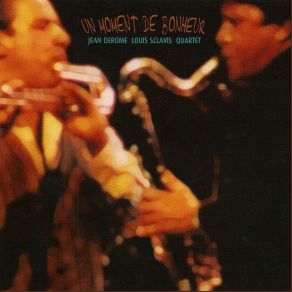Un Moment De Bonheur
Download links and information about Un Moment De Bonheur by Jean Derome, Louis Sclavis Quartet. This album was released in 2003 and it belongs to Jazz, Avant Garde Jazz genres. It contains 6 tracks with total duration of 58:05 minutes.

|
|
|---|---|
| Artist: | Jean Derome, Louis Sclavis Quartet |
| Release date: | 2003 |
| Genre: | Jazz, Avant Garde Jazz |
| Tracks: | 6 |
| Duration: | 58:05 |
| Buy it NOW at: | |
| Buy on iTunes $9.99 | |
Tracks
[Edit]| No. | Title | Length |
|---|---|---|
| 1. | Tu Dis Tout De Travers | 5:53 |
| 2. | Le Baiser | 7:31 |
| 3. | L'errance | 5:09 |
| 4. | Pas À Pas | 11:09 |
| 5. | Suite Pour Un Bal | 20:59 |
| 6. | Jonas | 7:24 |
Details
[Edit]The album title, Moment de Bonheur, is rather trite, but the concert was marvelous and the recording preserves all of its intensity and charm. This was a first meeting between Jean Derome (flutes, alto sax) and Louis Sclavis (clarinets, soprano sax). Although different, their sound worlds are highly compatible. They have both dug their way out of the jazz realm and into new, largely unexplored music trenches while keeping ties to jazz. They both use other idioms to transform jazz and turn it into something completely new. They both favor an approach that combines clever writing, wild improvising, and a touch of humor and emotion. To put the project on firm ground, they agreed on a solid rhythm section of bassist Bruno Chevillon (Sclavis' most trusted sideman), and drummer Pierre Tanguay (a regular of Derome's bands for two decades). The quartet hit it off incredibly well. Derome penned five of the six pieces presented here. His tunes show his usual taste for elegance in odd designs, and tenderness in comical gestures. The basic motif in "Tu Dis Tout de Travers" would fit nicely in the repertoire of his group Dangereux Zhoms, while his gripping bass flute solo in "Jonas" ranks among his best moments on record. Sclavis displays unusual levels of playfulness in "Le Baiser" and "Pas à Pas." He contributes the 21-minute "Suite pour un Bal," a cross-stylistic composition of epic proportions — including a passage where Chevillon adds a distortion pedal to his double bass. Tanguay's lumbering rhythms (his sense of out-rhythm is unique) match Chevillon's power plays in a quasi-rock way. The enthusiasm of the crowd is well-deserved. ~ François Couture, Rovi